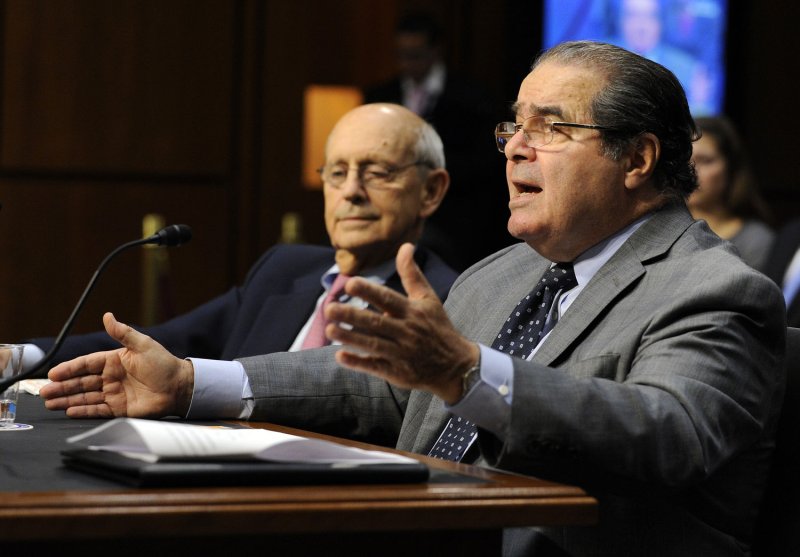Supreme Court Justices Stephen Breyer (L) and Antonin Scalia testify before the Senate Judiciary Committee hearing titled "Considering the Role of Judges Under the Constitution of the United States" on Capitol Hill in Washington on October 5, 2011. UPI/Roger L. Wollenberg |
License Photo
WASHINGTON, Dec. 16 (UPI) -- The U.S. Supreme Court, within the last five years, has twice decided the Second Amendment contains an individual right to bear arms. But in one of those majority rulings, the court's most conservative justice left room to control the types of weapons used in the Newtown, Conn., elementary school massacre, where 26 people were slaughtered in an elementary school, including 20 young children, before the gunman killed himself.
After each high-profile shooting -- three just this year -- politicians argue over new gun control measures, and the latest is expected to spark a similar debate.
In 2008's District of Columbia vs. Heller and in 2010's McDonald vs. Chicago a narrow majority of Supreme Court justices ruled that the Second Amendment guarantees the right to bear arms for defense in the home.
But writing for the 5-4 majority in Heller, Justice Antonin Scalia said the right to bear arms is not absolute. Scalia's words carry considerable weight because he is a conservative champion, and perhaps the high court's most ardent exponent of the right to bear arms.
"Like most rights, the right secured by the Second Amendment is not unlimited," Scalia cautioned in his opinion. "From Blackstone through the 19th-century cases, commentators and courts routinely explained that the right was not a right to keep and carry any weapon whatsoever in any manner whatsoever and for whatever purpose. ... For example, the majority of the 19th-century courts to consider the question held that prohibitions on carrying concealed weapons were lawful under the Second Amendment or state analogues."
Attempts to control types of weapons and who can possess weapons appear to be constitutional, Scalia added.
"Although we do not undertake an exhaustive historical analysis today of the full scope of the Second Amendment, nothing in our [majority] opinion should be taken to cast doubt on longstanding prohibitions on the possession of firearms by felons and the mentally ill, or laws forbidding the carrying of firearms in sensitive places such as schools and government buildings, or laws imposing conditions and qualifications on the commercial sale of arms.
"We also recognize another important limitation on the right to keep and carry arms. [Precedent says] that the sorts of weapons protected were those 'in common use at the time' [the Second Amendment was approved]. ... We think that limitation is fairly supported by the historical tradition of prohibiting the carrying of 'dangerous and unusual weapons.'"
Modern efforts at federal gun control remain something of a patchwork.
The Clinton-era ban on the purchase of semi-automatic assault weapons, porous for political reasons, and the ban on "large capacity ammunition feeding devices" expired in 2004. A Democratic majority Congress elected in 2006 chose not to renew it.
The National Rifle Association's special Web site, GunBaNObama.com, warns President Obama called for reintroduction of a semi-auto firearm ban on Oct. 16.
"And so what I'm trying to do is to get a broader conversation about how do we reduce the violence generally," the website quoted Obama as saying. "Part of it is seeing if we can get an assault weapons ban reintroduced."
Following the latest atrocity, Obama said, "We're going to have to come together and take meaningful action to prevent more tragedies like this, regardless of the politics."
The site, as it has since before the 2008 election, also repeats its continual warning -- "Obama would be the most anti-gun president in American history."
Instant background check restrictions on federally licensed dealers are still in place, but there are no restrictions on private sellers.
In 2008's District of Columbia vs. Heller, the court's five conservatives struck down the capital's gun control law. The law banned handgun possession by making it a crime to carry an unregistered firearm and prohibiting the registration of handguns. It separately mandated that no one could carry an unlicensed handgun, authorized the police chief to issue one-year licenses, and required residents to keep lawfully owned firearms unloaded and dissembled or bound by a trigger lock or similar device.
Writing for the majority, Scalia said, "We hold that the district's ban on handgun possession in the home violates the Second Amendment, as does its prohibition against rendering any lawful firearm in the home operable for the purpose of immediate self-defense."
The Second Amendment says, "A well regulated militia being necessary to the security of a free state, the right of the people to keep and bear arms shall not be infringed."
Two years later, the same narrow majority struck down Chicago's handgun ban. The case asked whether the 14th Amendment, which applies the Bill of Rights to the states, protects the Second Amendment right to bear arms in the states.
"Our decision in Heller points unmistakably to the answer," Justice Samuel Alito wrote in the narrow majority opinion in McDonald vs. Chicago. "Self-defense is a basic right, recognized by many legal systems from ancient times to the present day, and in [2008's] Heller, we held that individual self-defense is 'the central component' of the Second Amendment right. ... Explaining that 'the need for defense of self, family and property is most acute' in the home ... we found that this right applies to handguns because they are 'the most preferred firearm in the nation to "keep"' and use for protection of one's home and family.'
"Thus, we concluded, citizens must be permitted 'to use [handguns] for the core lawful purpose of self-defense.'"















